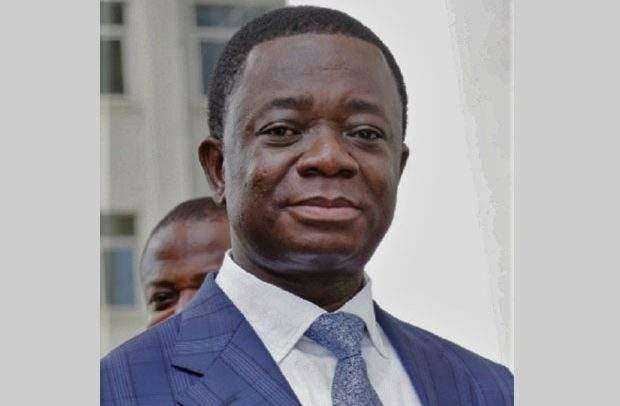COCOBOD trial: No fertiliser, CEO is blameable for production fall - Dir. of RM&E tells court
 Dr Stephen Opuni
Dr Stephen Opuni
The fall in Ghana's national cocoa production at any crop season cannot be blamed on any particular fertiliser that was applied nor the Chief Executive Officer nor the management of the Ghana Cocoa Board, Dr. Francis Baah, Director of Research, Monitoring and Evaluation at COCOBOD has told the court hearing the financial loss case against Dr Stephen Opuni, who is a former CEO of the state company, and businessman Seidu Agongo.
The two, together with the latter's company, Agricult Ghana Limited, are being prosecuted for causing a loss of GHS217 million to the state for the supply of, what the prosecution describes as substandard fertiliser, Lithovit, to COCOBOD.
Even though countless farmers who have testified as witnesses in the case have insisted on the efficacy of Lithovit liquid fertiliser, the prosecution argues that it failed to make any positive impact on cocoa production in the 2014/15 crop season.
According to COCOBOD's records made available to the court, in the 2012/13 crop season, the total national production of cocoa was 835,466.19 metric tonnes.
In the 2013/14 season, it increased to more than 896,000 metric tonnes. It then fell to 740254.06 metric tonnes in the 2014/15 crop season in which Lithovit was procured, distributed and applied to cocoa farms.
However, Dr Baah told the court on Thursday, 21 March 2024, that just like the rise in production cannot be credited to any one particular fertiliser, so, too, can a production fall not be blamed on any one particular fertiliser.
He said the production figure is an expression of the relationship between the plant and the environment.
"The environment includes rain fall, nature of farmer practices, crop protection against pests and diseases; fertilisers and other variables", Dr Baah explained to the court.
Asked by Mr Benson Nutsukpui, lead counsel for Mr Agongo and Agricult, whether he would attribute the dip in production for the 2014/15 to any one particular fertiliser brand out of the many applied to cocoa farms that year, he answered: "My lord, I will not".
From the 2014/2015 season, the production jumped to 778,043.38 metric tonnes.
Again, asked if he could attribute the rise to any particular fertiliser, Dr Baah repeated: "My lord, I will not".
COCOBOD's records showed that in 2021, the yield jumped to 1,047,384.94.metric tonnes then fell to 683,268.94 metric tonnes the following year -- a 40 per cent dip.
Asked again if it would be right for anybody to blame the fertilisers applied or the CEO of COCOBOD at the time, for the fall, Dr Baah said that would be unacceptable.
Explaining to the court in his evidence in chief, why the CEO must not be blamed for the 40 per cent dip in production, Dr Baah answered: "My lord, I will not blame my chief executive because he doesn't have the control over the elements and doesn't even control the world price".
"Would you attribute the fall in production from 2020/21 cocoa season to 2021/22 cocoa season to any fertiliser procured under the Chief Executive at the time", asked Mr Nutsukpui, to which Dr Baah replied: "My lord, I will not. The changes of the vagaries in production figure is pinched on a basket of facts", he noted.
Furthermore, asked about who he would blame for the further fall in production to 656,139.87 metric tonnes in the 2022/23 cocoa season, Dr Baah said: 'My lord, I'm not in the position to blame anybody".
"Which fertiliser do you blame for that?" Mr Nutsukpui asked, to which the witness answered: "I blame no input".
Mr Nutsukpui deducted the 2022/23 production figure of 656139.87 metric tonnes from that of the 2016/17 figure of 969510.69 metric tonnes, for which he got a figure of 313,370.82 metric tonnes and then asked Dr Baah if anybody been held responsible for the productions of the 2021/22 and 2022/23 seasons.
"My lord, I don't know", Dr Baah answered.
"Would it be appropriate for the management of COCOBOD for 2021/22 to be held responsible for the fall in production, when you yourself had said was as a result of a basket of issues; and that no agronomy practice, husbandry or management can determine the production?" the witness was asked again.
"My lord, I don't think we can, unless, my lord, there is clear evidence of [dereliction] of duties by any staffer", he answered.
"Can any particular fertiliser be held responsible for the fall we have seen in production in 2021/22 and 2022/23?" asked Mr Nutsukpui again.
"I don't think so", Dr Baah replied.
The case has been adjourned to 8 April 2024 by trial judge Justice Aboagye Tandoh, at which sitting the cross-examination of Mr Agongo's second witness is expected to be continued.
Source: Classfmonline.com
Trending News

Mahama coming back because Akufo-Addo has failed – Ayariga
14:10
NDC petitions Speaker on missing BVDs at EC
13:21
Clear indication defeat staring NPP in the face - NDC
10:58
Bawumia jets to Italy for bilateral discussions with Pope
13:14
Train crash: I'd be asking some serious questions were I president – Mahama
07:02
Akatakyie AX group celebrates 72nd anniversary of Opoku Ware School with project
10:32
Dumsor must stop demo part 2: We’ll choose how we demonstrate and who to partner – Franklin Cudjoe replies Yvonne Nelson
10:17
Petrol bomb attack on CMG shocking; we’ve not seen this type before’ – GIBA
10:00
Adu Boahen’s murder: Police arrest house help who was in possession of deceased’s personal belongings
08:54
Naana Jane embodies authority and authenticity - Joyce Bawah insists
12:58



